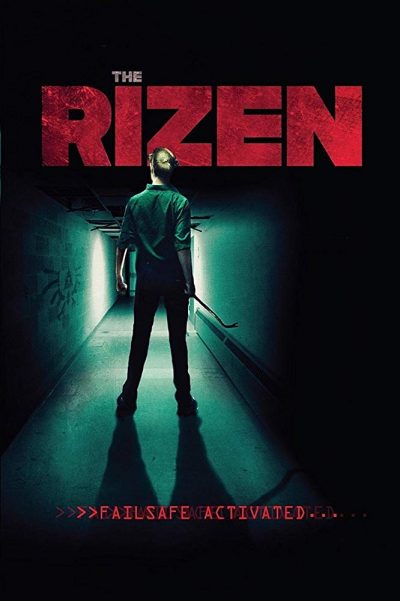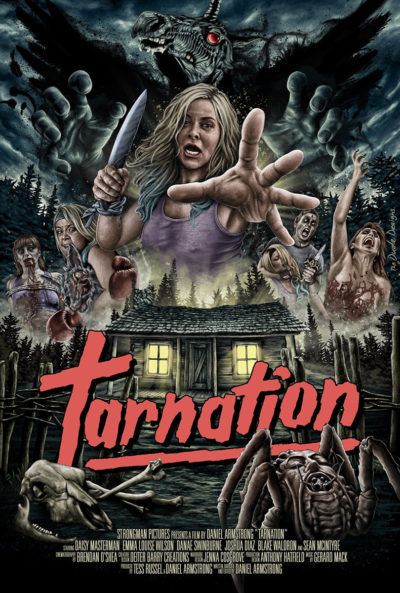★★
“Dead cat bounce.”
 It’s quite a feat for a film which runs a crisp 67 ½ minutes to outstay its welcome, so… Well done? The problem is mostly that far too much time is wasted on the set-up, introducing us – in quite excruciating detail – to characters in whom we have little or no interest. These would be the friends who decide to spend a weekend in upstate New York, unaware they are about to cross paths with a pair of bored locals who have decided to alleviate the tedium by going on a killing spree. When one of them gets cold feet, however, it’s left up to Cat (Rafferty) to follow through on the original plan, which she does with some enthusiasm. Just a pity this doesn’t happen until roughly the final twenty minutes.
It’s quite a feat for a film which runs a crisp 67 ½ minutes to outstay its welcome, so… Well done? The problem is mostly that far too much time is wasted on the set-up, introducing us – in quite excruciating detail – to characters in whom we have little or no interest. These would be the friends who decide to spend a weekend in upstate New York, unaware they are about to cross paths with a pair of bored locals who have decided to alleviate the tedium by going on a killing spree. When one of them gets cold feet, however, it’s left up to Cat (Rafferty) to follow through on the original plan, which she does with some enthusiasm. Just a pity this doesn’t happen until roughly the final twenty minutes.
Up until that point, the film makes the mistake of concentrating on the victims. They are, by and large, not people with whom you would want to spend more than five minutes. To the movie’s credit, this does appear to be deliberate, yet it renders every moment an increasingly aggravating experience. That’s especially the case, when contrasted with the lack of motive provided for Cat and her partner, who simply choose to become murderers in virtually the first scene, with little or no justification. More time spent building towards that decision, and less watching the Big Apple pals swapping tedious banter, would certainly have been a wise move. Heck, hanging out with the New Yorkers for a bit first would surely convince anyone about the wisdom of murder as a moral imperative. No jury in the land would convict.
Indeed, the whole spree-killing couple angle is given such short shrift, I was left wondering why the directors bothered. However, this isn’t necessarily a bad thing, as when it’s just Cat operating by herself, things get done at a considerably brisker clip, which is certainly to the film’s benefit. [I’m not certain the likes of Milton Bradley, Victoria’s Secret and John Deere will be quite as enamored by the name-checks their products receive over the course of proceedings here – particularly the last] After capturing and disposing of a set of victims, it ends with Cat going up against final girl Alana (Loren), and it’s then that the film is at its bes… uh, least underwhelming.
Definitely a case of too little, too late however, even with the final twist, which I’ll admit gave me a dark chuckle. The makers here claim they were going for something giallo-esque. I know giallo. And this is no giallo. Given the complete lack of style shown, it’s more like a bad eighties straight-to-video slasher pic, with all the lack of gore, shortage of tension and terrible pacing that implies. Rafferty gets a full pass and Loren a partial, with their more energetic performances something the rest of the cast would have benefited from following. Otherwise, it’s hardly catnip for horror fans.
Dir: Alexander Cherney, Gregory Casino
Star: Alanah Rafferty, Kay Marie Loren, Daniel J. O’Connor, Will Scarlett





 Around the turn of the millennium, Parvana (Chaudry) is an 11-year-old girl living in Kabul, Afghanistan – then under the strict religious rule of the Taliban, in the aftermath of the Russian retreat. Her father is arrested and taken off to prison, leaving his wife and children without a male guardian. Which is kinda important, because under Taliban law, women are not allowed out in public unaccompanied. With no other option, Parvana cuts her hair and dresses as a boy in order to be able to get supplies for her family. Teaming up with another boy-who-isn’t, Shauzia (Bhatia), they find work. Parvana starts saving for the bribes necessary to see, and hopefully win the release of, her father; Shauzia is saving up for her long-held dream of seeing the ocean. Of course, it’s never that easy, especially post-9/11, when the country is invaded by America and its allies.
Around the turn of the millennium, Parvana (Chaudry) is an 11-year-old girl living in Kabul, Afghanistan – then under the strict religious rule of the Taliban, in the aftermath of the Russian retreat. Her father is arrested and taken off to prison, leaving his wife and children without a male guardian. Which is kinda important, because under Taliban law, women are not allowed out in public unaccompanied. With no other option, Parvana cuts her hair and dresses as a boy in order to be able to get supplies for her family. Teaming up with another boy-who-isn’t, Shauzia (Bhatia), they find work. Parvana starts saving for the bribes necessary to see, and hopefully win the release of, her father; Shauzia is saving up for her long-held dream of seeing the ocean. Of course, it’s never that easy, especially post-9/11, when the country is invaded by America and its allies. Helen (Fonseca) is struggling to come to terms with the sudden, unexpected death of her scientist husband, who was engaged on a top-secret project with his partner, Tomas (Morshower). Then things get truly weird: she experiences the mother of all blackouts, missing an entire week, and shortly afterward, Helen receives a phone-call warning her to get out of her house… from herself. It turns out, husband and Tomas had come up with a limited form of time-travel. As a result of this and subsequent events, there are now
Helen (Fonseca) is struggling to come to terms with the sudden, unexpected death of her scientist husband, who was engaged on a top-secret project with his partner, Tomas (Morshower). Then things get truly weird: she experiences the mother of all blackouts, missing an entire week, and shortly afterward, Helen receives a phone-call warning her to get out of her house… from herself. It turns out, husband and Tomas had come up with a limited form of time-travel. As a result of this and subsequent events, there are now  This is about the third Lovecraftian film I’ve seen with a heroine in the past year or so, after
This is about the third Lovecraftian film I’ve seen with a heroine in the past year or so, after  China seems to have discovered SF in a big way of late, most recently with The Wandering Earth, the biggest blockbuster you’ve probably never heard of. At time of writing, it’s the #7 film at the world-wide box-office this year, though 99% of its tally came in its home country. A couple of years earlier, this film made much less impact, yet for me is superior. It’s a time-travel piece, not dissimilar to Run Lola Run, with a triptych repeating the same events in three different ways, as the heroine strives to achieve a satisfactory outcome.
China seems to have discovered SF in a big way of late, most recently with The Wandering Earth, the biggest blockbuster you’ve probably never heard of. At time of writing, it’s the #7 film at the world-wide box-office this year, though 99% of its tally came in its home country. A couple of years earlier, this film made much less impact, yet for me is superior. It’s a time-travel piece, not dissimilar to Run Lola Run, with a triptych repeating the same events in three different ways, as the heroine strives to achieve a satisfactory outcome. There is entertainment value to be found even in bad movies. Bad action, horror and SF are sometimes just as amusing as the good stuff. But bad comedy is almost irredeemable: that’s why Mystery Science Theater 3000 rarely go there. Bad comedy just… sits there, dull and unamusing, almost worthless. And that’s what we have here. It’s a somewhat interesting idea, with some potential. Unfortunately, the execution – mostly in the script and direction – are so woefully inept that even the brave efforts of Florence Henderson, in her final film, aren’t enough to salvage it. And wasting the talents of Pam Grier needs to be some kind of cinematic capital offense.
There is entertainment value to be found even in bad movies. Bad action, horror and SF are sometimes just as amusing as the good stuff. But bad comedy is almost irredeemable: that’s why Mystery Science Theater 3000 rarely go there. Bad comedy just… sits there, dull and unamusing, almost worthless. And that’s what we have here. It’s a somewhat interesting idea, with some potential. Unfortunately, the execution – mostly in the script and direction – are so woefully inept that even the brave efforts of Florence Henderson, in her final film, aren’t enough to salvage it. And wasting the talents of Pam Grier needs to be some kind of cinematic capital offense. Maggie (Dragus) just failed the police entry exam in humiliating fashion, and is now taking a course to become a security officer, despite her meek nature. She encounters Tiger (Rumpf), a street punk girl who is everything Maggie is not: brash, confident and perfectly willing to go toe-to-toe with anyone she feels deserves it. The pair strike up an unlikely friendship, with a purloined uniform allowing Tiger to join Maggie in her security work, and in turn engage her increasing fondness for mayhem and violence. Meanwhile, Tiger’s example helps bring Maggie – or ‘Vanilla’, as Tiger calls her in half-mocking endearment – out of her shell. Though Tiger’s drug-dealing friends are less than impressed to find her palling around with a wannabe cop. And as Maggie begins to adopt a more… physical approach to confrontation, it becomes clear that Tiger’s restraint is something Maggie does not possess.
Maggie (Dragus) just failed the police entry exam in humiliating fashion, and is now taking a course to become a security officer, despite her meek nature. She encounters Tiger (Rumpf), a street punk girl who is everything Maggie is not: brash, confident and perfectly willing to go toe-to-toe with anyone she feels deserves it. The pair strike up an unlikely friendship, with a purloined uniform allowing Tiger to join Maggie in her security work, and in turn engage her increasing fondness for mayhem and violence. Meanwhile, Tiger’s example helps bring Maggie – or ‘Vanilla’, as Tiger calls her in half-mocking endearment – out of her shell. Though Tiger’s drug-dealing friends are less than impressed to find her palling around with a wannabe cop. And as Maggie begins to adopt a more… physical approach to confrontation, it becomes clear that Tiger’s restraint is something Maggie does not possess. This takes place in upstate New York during the 1812 war between Britain and America, when combatants are courting the Mohawk tribe to join forces with them. The natives are suspicious of both, and won’t commit to either. Working for the British is Joshua (Farren), who is in a slightly odd, three-way relationship with Mohawk warrioress Oak (Horn) and fellow native Calvin (Rain). On the other side is Hezekiah Holt (Buzzington), and his small band of Americans, who are out for redcoat blood. When they blame the Mohawk for murdering some of their number, their violence quickly extends to encompass Oak and Calvin, as well as Joshua. After Oak is left all alone, she goes on the war-path to take revenge on Holt and his men.
This takes place in upstate New York during the 1812 war between Britain and America, when combatants are courting the Mohawk tribe to join forces with them. The natives are suspicious of both, and won’t commit to either. Working for the British is Joshua (Farren), who is in a slightly odd, three-way relationship with Mohawk warrioress Oak (Horn) and fellow native Calvin (Rain). On the other side is Hezekiah Holt (Buzzington), and his small band of Americans, who are out for redcoat blood. When they blame the Mohawk for murdering some of their number, their violence quickly extends to encompass Oak and Calvin, as well as Joshua. After Oak is left all alone, she goes on the war-path to take revenge on Holt and his men. If you took four different films, by four different directors, and edited them together into a single entity, you might end up something similar to this. Oh, make no mistake: I still enjoyed most of this. It just doesn’t feel like a coherent whole, perhaps because it is a spin-off involving some of the same characters from an earlier film, Baby. For at least three-quarters of it, however, not having seen its predecessor shouldn’t be too much of a problem.
If you took four different films, by four different directors, and edited them together into a single entity, you might end up something similar to this. Oh, make no mistake: I still enjoyed most of this. It just doesn’t feel like a coherent whole, perhaps because it is a spin-off involving some of the same characters from an earlier film, Baby. For at least three-quarters of it, however, not having seen its predecessor shouldn’t be too much of a problem. Following on after
Following on after